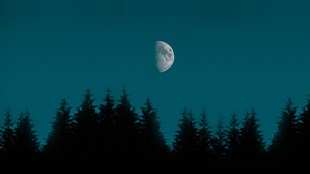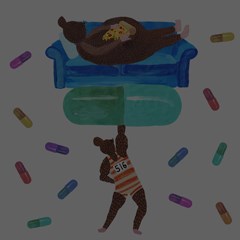MARGO WHITE: This year the Nobel Prize in physiology or medicine was awarded to three researchers for their discoveries of molecular mechanisms controlling the circadian rhythm. Are circadian rhythms being taken seriously as an area of scientific research?
RICHARD STEVENS: Circadian biology has been considered a bit of a quaint sideline that didn’t matter very much, but that began to change about 30 years ago, and it’s now clear that circadian biology is fundamental to all biology, to almost all organisms on the planet. Except perhaps extremophiles, the organisms that live down by the vents on the ocean floor where there isn’t any sunlight. But it’s in the genes of everything else – plants, insects, birds, fish, mammals, many of the bacteria in our gut, pretty much all life forms.
What are circadian rhythms, and what do they do?
Life evolved on Earth several billion years ago in a reliable cycle of light and dark, so that solar signal moulded an endogenous circadian rhythmicity in almost all life forms. In humans, that’s controlled by a group of cells at the base of the brain called the suprachiasmatic nucleus (SCN), a gland that is the master circadian pacemaker. That drives the sleep-wake cycle, core body temperature, metabolism, hormone production and so on.
Basically this means we have nighttime and a daytime physiology – after sunset, we start getting sleepy, our brain calms down, body temperature drops, metabolism slows down, and some hormones rise and others drop.
Why was this useful to humans, from an evolutionary point of view?
So being able to anticipate the transition from day to night and night to day provides a strong competitive advantage for an organism. For instance, our levels of leptin, the hormone that inhibits hunger, are high at night, which is important for human beings because we evolved at a time when it would be dangerous to be running around at night trying to find food. When leptin levels drop, we start to feel hungry – the early bird catches the worm.
But nowadays a lot of us are getting very little daylight, especially if you don’t have a window in your office, and too much bright light at night. This can lead to “circadian disruption”.
And what are the health consequences of that?
We know for sure that short-term disruption of circadian rhythms makes people feel uncomfortable; it compromises sleep, and cognitive performance declines.
There’s not a consensus about long-term consequences, but the evidence is mounting; we know that shift workers have an increased risk of obesity, cardiovascular disease and diabetes. I’m a cancer epidemiologist, and I would say about 70 percent of cancer researchers and epidemiologists would agree that shift workers are at increased risk of breast cancer. For me the evidence is now pretty firm.
How well can you separate disrupted circadian rhythm from lack of sleep, in terms of health consequences?
To me it’s little bit of a false distinction, because sleep is a very important aspect of circadian rhythmicity. Melatonin is an extremely important signaling molecule for our circadian system. We have low levels of melatonin during the day and, melatonin production rises during the night – in the absence of electric light.
A study done by Harvard researchers had people read a backlit e-reader versus a regular book, both by dim light. They all went to dark [the lights were switched off] about 10pm. The results showed that those who read the back-lit e-reader, which emitted a lot of bright blue photons, had compromised sleep, a delay in the rise in melatonin, and the next morning felt much groggier compared to the book readers.
Experiments have also shown that if you put people in a lab and put the lights out at 9pm, and back on at 6am, which is nine hours of dark, people will sleep about six or seven hours. If you wake them up the middle of night, their melatonin levels won’t change; they’ll still have a nighttime physiology.
But if you turn on the light?
Dark is required for a robust circadian rhythmicity, but sleep is not – if you awaken in the middle of the night but stay in the dark, you also stay in nighttime physiology. We have daytime physiology and nighttime physiology, and it really does follow the sun. Turn on a light with sufficient intensity in the night, and your melatonin is going to drop like a rock.
Do you have recommendations then, to keep our circadian rhythm on track, and get a good night’s sleep?
Keep your bedroom as dark as you can. Everyone wakes up in the middle of the night and it’s perfectly normal, but if you have to get up and go to the bathroom, and you turn on those bright lights people have around the mirror, you’ll start the process of suppressing melatonin almost immediately. I use a red night light in the bathroom.
But remember that waking up in the night is perfectly normal, and if you do, stay in bed, in the dark, and enjoy it. Sleep doctors might disagree; if you’d asked them ten years ago, most would say, ‘if you wake up, leave the bedroom, the bedroom should only be for sleep’. That’s crap. In the modern world, that means turning on an electric light. If you get up and sit in a table with a candle, that’d be okay. But if you train yourself to realize it’s normal to wake in the night, it’s very pleasant to lie awake at night.
What about when we want to be awake, like in the early evening?
I’d recommend using low-watt incandescent light bulbs in the evening, because they emit a lot less blue light than compact fluorescent bulbs. But use a compact fluorescent bulb in the morning, especially if you can’t get outside and get some sunshine, because we do need a spike of blue light in the morning. But there are many details that need to be worked out – how much blue light can you get in the evening without disrupting circadian rhythmicity, for example. But the simple rule is to get bright blue in the morning and not in the evening.
People are now popping melatonin in a pill form, to get a good night’s sleep. Is that a good idea?
No, melatonin will help you get to sleep but you don’t need a pill. If you’re sleeping where it’s dark, and you’ve got a healthy lifestyle, your melatonin levels are going to be just fine. Sometimes there’s a place for melatonin pills – if you’re jet lagged for example. It’s also useful for some blind people who don’t perceive light, and there may be some applications for shift workers, but otherwise, it’s just not a good idea.
Why not?
If you take a melatonin pill at 10pm, you will phase-advance yourself. That is, it will change your circadian physiology. Melatonin naturally peaks about one in the morning, but if you take a pill that shoots your melatonin up ten times higher than it should be at 10pm, your body will think it’s 1am at 10pm.
We do know that in the short run taking melatonin can actually disrupt your circadian physiology, and most of the scientific community recognizes that melatonin is a hormone and we don’t know the long-term health effects of taking it every day for many years.
Many scientists now say there’s too much light in the world that is disrupting our circadian rhythms. What should we do – turn off all the lights?
Well, I’m not going to live in a cave and depend on a wood fire for light, but we can do much better with lighting design and application. We need to be more aware that, for instance, when you’ve come home from work, you should turn off as many lights as you can while still being comfortable with what you need to do. The market is now responding to this. At least one manufacturer has a product that you can program to change intensity and wavelength, for circadian health. We have the technology to do much better in our lighting.
10 THINGS YOU SHOULD KNOW ABOUT YOUR CIRCADIAN HEALTH
- Circadian biology – the way our bodies respond to light, day and night – is hard-wired by evolution into our genes
- We have quite different night-time and daytime physiologies which affect our brains, bodies and metabolism
- Disrupted circadian rhythms may affect long-term risk of various diseases and conditions
- The hormone melatonin is central to our circadian biology – it drops during the day and rises at night
- Electric light affects the production of melatonin and disrupts sleep, as do back-lit screens such as e-readers and phones
- Sleeplessness is not necessarily a sign of disrupted circadian rhythms – waking during the night is normal
- Lying in the dark is fine – getting up and putting on an electric light will inevitably disrupt melatonin levels and increase sleeplessness
- Keeping evening lighting to a minimum, and using low-wattage incandescent light bulbs will help your body’s natural circadian cycle
- Melatonin-based medication can trick your body’s natural clock and is not helpful for normal sleep (but may be useful for jetlag)
- Melatonin is a hormone and the long-term effects of taking it are not known

Richard Stevens is a professor at the School of Medicine, University of Connecticut, and has spent much of his career looking at why people get cancer. In 1987 he proposed a radical new theory that the use of electric lighting might produce “circadian disruption”, causing changes in the hormones relevant to breast cancer risk. Accumulating evidence has generally supported the idea, and it has received wide scientific and public attention.
Follow the freshest thinking @fitplanetmag.







